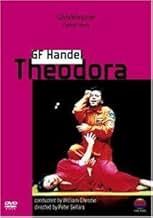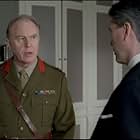- Director
- Writer
- All cast & crew
- Production, box office & more at IMDbPro
Storyline
Featured review
Peter Sellars sets the production in (around) the present and while several things may not make literal sense (e.g., an American president condemning a virtuous Christian woman to a sentence of prostitution at the Temple of Venus for not worshiping Roman gods), the contemporary setting for the most part is powerfully effective.
Save for carry on props (chairs, etc.) the only "set" is an ever changing setting of enormous stressed antique Roman tear bottles. Profoundly simple and beautifully capturing the feel of the "ancient" in this updated setting.
Frode Olsen's President Valens opens the work declaring that his gods are to be worshiped and his happy followers (each carrying an American soft drink, which I thought to be a minor unfortunate directorial choice) rouse and begin the first of the big hand gestures which will occur throughout the rest of the night. For once Sellars' use of hand gestures not only appropriate but excitingly useful. Olsen's rather large voice was exciting and reminded me a little of Triegle's turn as Giulio Cesare.
As two of the president's main guards, David Daniels (Didymus) and Richard Croft (Septimius) are magnificent. While much is written about Daniels, I have for years been amazed by the sheer beauty of Richard Croft's voice. I have always been a fan, and his singing here evoked beautiful memories of a Semele a few years back where his "Where 'er you walk" won the prize for the most beautiful singing I've experienced live.
It is nearly impossible to separate Sellars direction of "Theodora" from the vocal performances - there is so much going on, indeed, the entire work achieves a nearly balletic performance. I would imagine it, in our era especially, to strip sexuality from a stage work, to be extremely difficult.
Sellars, early on, establishes same sex bonding, first between Didymus & Septimius, later Theodora and Irene with such beauty, gentleness and honesty that later, when men and women are touching it is never perceived as sexual - rather compassion.
One of the most beautiful of images occurs during Septimius' aria "Descend kind pity, heavenly guest." Sellars has created a pas de deux between the two soldiers Croft alone singing, imploring heaven's pity. At the downward scale sung on the word "descend" Didymus' arms repeat a falling motion finally encircling Septimius. When Septimius faces up and sees his fellow soldier he is startled, profoundly touched, wiping tears from his eyes. We witness a bonding deeper than either foreshadowing the compassion and highlighting the similarities between these two different men. It doesn't hurt that Croft sings with the most ravishing tone one is likely to ever encounter in this role.
Late his bravura aria "Dread the fruits of Christian folly" lets him sing what may be the fastest coloratura I've heard a tenor execute. His performance, as well as Lorraine Hunt Lieberson are the highlights of this extraordinarily beautiful evening.
Of Ms. Hunt, all I can ask is: has there EVER been a better singer of this type of music? Her Irene is simply an overwhelmingly powerful presence. Sellars has cast Irene as the leader of the Christian sect to which Theodora belongs. She is obviously and passionately devoted to her congregation and it is clear this community would follow her to the ends of the world. Irene has some of the best music in "Theodora" and Hunt sings it with such passion and aching beauty, nowhere (for me)more than in "As with rosey steps the morn. This is one of Handel's most exquisitely beautiful arias and Hunt's singing of this is simply ravishing. She is up to big coloratura work in "Bain of Virtues" and her ornamentation in the di capo is thrilling stuff.
Dawn Upshaw's Theodora is one of the best things she's ever done. The image of her, in simple white, rising from her chair at what looks like a prayer meeting is a stunning image as she begins her aria "Fond flattering world adieu." Her voice was built for this type of slow Handel aria. Sellars gives her some of the grandest arm/hand gestures of the cast and Upshaw's execution of them was believable - never once looking artificial, rather as if merely another extension of the music. "Angels ever bright and fair" provides another stunning visual moment when Septimius, with his soldiers, reluctantly but dutifully leads her away to "that vile place." The arresting image of Theodora in virginal white, and the soldiers in their orange riot gear is hard to forget.
The prison scene, a darkened stage with a large yellow square representing her cell finds Theodora in a red bathrobe over a white slip. Upshaw's movements become Martha Grahams all tortured angles and match the coloring of her singing. Foregoing her typical pure sound Upshaw is unafraid to emit painful, frightened sobs and frenzied hyperventilating, unifying physical and vocal performance into a dramatic whole. The image of her on the floor, palms and feet extending upward, robe barely wrapped around her magnificently projects the image of a renaissance saint ascending to heaven.
William Christie and the Orchestra of the Age of Enlightenment and the Glyndebourne chorus are completely "on" throughout the entire performance. I cannot recommend this videotape highly enough. What lucky audiences Glyndebourne had for this magical production. A wonderful achievement by all involved.
Save for carry on props (chairs, etc.) the only "set" is an ever changing setting of enormous stressed antique Roman tear bottles. Profoundly simple and beautifully capturing the feel of the "ancient" in this updated setting.
Frode Olsen's President Valens opens the work declaring that his gods are to be worshiped and his happy followers (each carrying an American soft drink, which I thought to be a minor unfortunate directorial choice) rouse and begin the first of the big hand gestures which will occur throughout the rest of the night. For once Sellars' use of hand gestures not only appropriate but excitingly useful. Olsen's rather large voice was exciting and reminded me a little of Triegle's turn as Giulio Cesare.
As two of the president's main guards, David Daniels (Didymus) and Richard Croft (Septimius) are magnificent. While much is written about Daniels, I have for years been amazed by the sheer beauty of Richard Croft's voice. I have always been a fan, and his singing here evoked beautiful memories of a Semele a few years back where his "Where 'er you walk" won the prize for the most beautiful singing I've experienced live.
It is nearly impossible to separate Sellars direction of "Theodora" from the vocal performances - there is so much going on, indeed, the entire work achieves a nearly balletic performance. I would imagine it, in our era especially, to strip sexuality from a stage work, to be extremely difficult.
Sellars, early on, establishes same sex bonding, first between Didymus & Septimius, later Theodora and Irene with such beauty, gentleness and honesty that later, when men and women are touching it is never perceived as sexual - rather compassion.
One of the most beautiful of images occurs during Septimius' aria "Descend kind pity, heavenly guest." Sellars has created a pas de deux between the two soldiers Croft alone singing, imploring heaven's pity. At the downward scale sung on the word "descend" Didymus' arms repeat a falling motion finally encircling Septimius. When Septimius faces up and sees his fellow soldier he is startled, profoundly touched, wiping tears from his eyes. We witness a bonding deeper than either foreshadowing the compassion and highlighting the similarities between these two different men. It doesn't hurt that Croft sings with the most ravishing tone one is likely to ever encounter in this role.
Late his bravura aria "Dread the fruits of Christian folly" lets him sing what may be the fastest coloratura I've heard a tenor execute. His performance, as well as Lorraine Hunt Lieberson are the highlights of this extraordinarily beautiful evening.
Of Ms. Hunt, all I can ask is: has there EVER been a better singer of this type of music? Her Irene is simply an overwhelmingly powerful presence. Sellars has cast Irene as the leader of the Christian sect to which Theodora belongs. She is obviously and passionately devoted to her congregation and it is clear this community would follow her to the ends of the world. Irene has some of the best music in "Theodora" and Hunt sings it with such passion and aching beauty, nowhere (for me)more than in "As with rosey steps the morn. This is one of Handel's most exquisitely beautiful arias and Hunt's singing of this is simply ravishing. She is up to big coloratura work in "Bain of Virtues" and her ornamentation in the di capo is thrilling stuff.
Dawn Upshaw's Theodora is one of the best things she's ever done. The image of her, in simple white, rising from her chair at what looks like a prayer meeting is a stunning image as she begins her aria "Fond flattering world adieu." Her voice was built for this type of slow Handel aria. Sellars gives her some of the grandest arm/hand gestures of the cast and Upshaw's execution of them was believable - never once looking artificial, rather as if merely another extension of the music. "Angels ever bright and fair" provides another stunning visual moment when Septimius, with his soldiers, reluctantly but dutifully leads her away to "that vile place." The arresting image of Theodora in virginal white, and the soldiers in their orange riot gear is hard to forget.
The prison scene, a darkened stage with a large yellow square representing her cell finds Theodora in a red bathrobe over a white slip. Upshaw's movements become Martha Grahams all tortured angles and match the coloring of her singing. Foregoing her typical pure sound Upshaw is unafraid to emit painful, frightened sobs and frenzied hyperventilating, unifying physical and vocal performance into a dramatic whole. The image of her on the floor, palms and feet extending upward, robe barely wrapped around her magnificently projects the image of a renaissance saint ascending to heaven.
William Christie and the Orchestra of the Age of Enlightenment and the Glyndebourne chorus are completely "on" throughout the entire performance. I cannot recommend this videotape highly enough. What lucky audiences Glyndebourne had for this magical production. A wonderful achievement by all involved.
Details
Contribute to this page
Suggest an edit or add missing content







